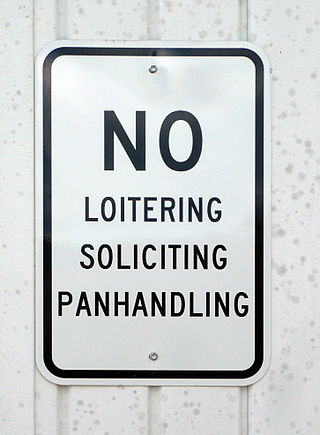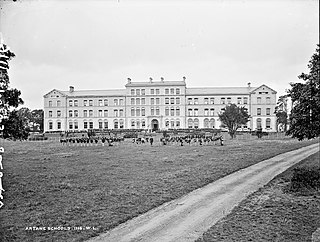
Magdalene asylums, also known as Magdalene laundries, were initially Protestant but later mostly Roman Catholic institutions that operated from the 18th to the late 20th centuries, ostensibly to house "fallen women". The term referred to female sexual promiscuity or work in prostitution, young women who became pregnant outside of marriage, or young girls and teenagers who did not have familial support. They were required to work without pay apart from meagre food provisions, while the institutions operated large commercial laundries, serving customers outside their bases.
A Borstal was a type of youth detention centre in the United Kingdom, several member states of the Commonwealth and the Republic of Ireland. In India, such a detention centre is known as a Borstal school.

The Juvenile Delinquents Act, SC 1908, c 40 was a law passed by the Parliament of Canada to improve its handling of juvenile crime. The act established procedures for the handling of juvenile offenses, including the government assuming control of juvenile offenders. It was revised in 1929 and superseded in 1984 by the Young Offenders Act.

A reform school was a penal institution, generally for teenagers mainly operating between 1830 and 1900. In the United Kingdom and its colonies reformatories commonly called reform schools were set up from 1854 onwards for youngsters who were convicted of a crime as an alternative to an adult prison. In parallel, "Industrial schools" were set up for vagrants and children needing protection. Both were 'certified' by the government from 1857, and in 1932 the systems merged and both were 'approved' and became approved schools.
A reformatory or reformatory school is a youth detention center or an adult correctional facility popular during the late 19th and early 20th centuries in Western countries. In the United Kingdom and United States, they came out of social concerns about cities, poverty, immigration, and gender following industrialization, as well as from a shift in penology to reforming instead of punishing the criminal. They were traditionally single-sex institutions that relied on education, vocational training, and removal from the city. Although their use declined throughout the 20th century, their impact can be seen in practices like the United States' continued implementation of parole and the indeterminate sentence.

Loitering is the act of standing or waiting around idly without apparent purpose.
The Commission to Inquire into Child Abuse (CICA) was one of a range of measures introduced by the Irish Government to investigate the extent and effects of abuse on children from 1936 onwards. Commencing its work in 1999, it was commonly known in Ireland as the Laffoy Commission after its chair, Justice Mary Laffoy. Laffoy resigned as chair in 2003 and was succeeded by Justice Sean Ryan, with the commission becoming known as the Ryan Commission. It published its final public report, commonly referred to as the Ryan report, in 2009.
The Parramatta Girls Home, also known as the Industrial School for Girls, Girls Training School and Girls Training Home, was a state-controlled child-welfare institution located in Parramatta, New South Wales, Australia which operated from 1887 until 1974.

An approved school was a type of residential institution in the United Kingdom to which young people could be sent by a court, usually for committing offences but sometimes because they were deemed to be beyond parental control. They were modelled on ordinary boarding schools, from which it was relatively easy to leave without permission. This set approved schools apart from borstals, a tougher and more enclosed kind of youth prison.
Laws against child sexual abuse vary by country based on the local definition of who a child is and what constitutes child sexual abuse. Most countries in the world employ some form of age of consent, with sexual contact with an underage person being criminally penalized. As the age of consent to sexual behaviour varies from country to country, so too do definitions of child sexual abuse. An adult's sexual intercourse with a minor below the legal age of consent may sometimes be referred to as statutory rape, based on the principle that any apparent consent by a minor could not be considered legal consent.

Vagrancy is the condition of homelessness without regular employment or income. Vagrants usually live in poverty and support themselves by begging, scavenging, petty theft, temporary work, or social security. Historically, vagrancy in Western societies was associated with petty crime, begging and lawlessness, and punishable by law with forced labor, military service, imprisonment, or confinement to dedicated labor houses.

The Vagrancy Act 1824 is an Act of Parliament of the United Kingdom that makes it an offence to sleep rough or beg in England and Wales. The legislation was passed in Georgian England to combat the increasing number of people forced to live on the streets due to the conclusion of the Napoleonic Wars and the social effects of the Industrial Revolution. Critics of the law included politician and abolitionist, William Wilberforce, who condemned the Act for making it a catch-all offence for vagrancy with no consideration of the circumstances as to why an individual might be homeless.

St. Josephs Industrial School, Artane was an Industrial School run by the Christian Brothers in Artane, Dublin from 1870 to 1969.
Industrial Schools were established in Ireland under the Industrial Schools Act 1868 to care for "neglected, orphaned and abandoned children". By 1884, there were 5,049 children in such institutions throughout the country. The Act was superseded by the Children Act 1908.

The Industrial Schools (Ireland) Act 1868 was an Act of Parliament which created Industrial Schools in Ireland to care for neglected, orphaned and abandoned children.
The Religious Sisters of Charity or Irish Sisters of Charity is a Roman Catholic religious institute founded by Mary Aikenhead in Ireland on 15 January 1815. Its motto is Caritas Christi urget nos.

The Magdalene Laundries in Ireland, also known as Magdalene asylums, were institutions usually run by Roman Catholic orders, which operated from the 18th to the late 20th centuries. They were run ostensibly to house "fallen women", an estimated 30,000 of whom were confined in these institutions in Ireland. In 1993, unmarked graves of 155 women were uncovered in the convent grounds of one of the laundries. This led to media revelations about the operations of the secretive institutions. A formal state apology was issued in 2013, and a £50 million compensation scheme for survivors was set up by the Irish Government. The religious orders which operated the laundries have rejected activist demands that they financially contribute to this programme.
The Magill Youth Training Centre, also known as the Boys Reformatory, McNally Training Centre and South Australian Youth Training Centre (SAYTC) since its founding in 1869, was the last iteration of a series of reformatories or youth detention centres in Woodforde, South Australia. The centre came under criticism in the 2000s for "barbaric" and "degrading" conditions and was replaced by a new 60-bed youth training centre at Cavan in 2012.
HMS Southampton was the third ship of the Royal Navy to carry the name Southampton. She was a fourth-rate, 52-gun ship. She was one of the six Southampton-class frigates.












